My blog has moved! http://www.patheos.com/blogs/markdroberts/
|
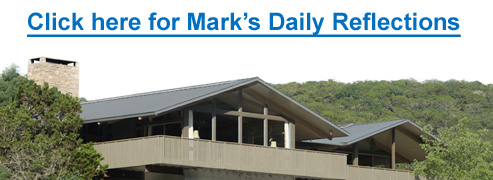 |
Twitter Feed for My Recent Blog Posts and Other Tweets |
My blog has moved! http://www.patheos.com/blogs/markdroberts/
|
The Barna Update: Four “Mega-Themes” Examined
By Mark D. Roberts | Tuesday, December 4, 2007
Part 1 of series: The Barna Update: Trends, Challenges, and Opportunities
Permalink for this post / Permalink for this series
The latest Barna Update is out. It highlights four “mega-themes” in our culture. They are:
• Americans’ unconditional self-love
• Nouveau Christianity
• The five Ps of parenting
• Designer faith with rootless values.
I encourage you to read the whole update. Rather than summarize every point, I’ll take an excerpt from the update and suggest an opportunity it presents for the church.
Americans’ Unconditional Self-Love
The Barna Update says:
The prevailing paths to maturation, however, are usually not characterized by planned or intentional development; instead, engagement in a series of adventurous experiments seems to be the norm. When it does occur, growth takes place rather unpredictably, and the changes accepted are typically adopted on the basis of feelings. Most Americans, it seems, are willing to change as long as the pathway promises benefit and enjoyment, and generally avoids pain, conflict and sacrifice.
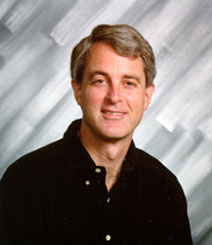 Shouldn’t the church be the place where people find a path to maturity that isn’t so random? Shouldn’t we be able to say to people, both Christian and not, “Here is a way to grow up, to have a meaningful and productive life”? Of course if this is going to happen, then the church needs to know how it can help people grow as human beings as well as people of faith. Do we have this knowledge? Perhaps, sometimes. But I fear many churches contribute to the “adventurous experiments” reality. (Photo: George Barna)
Shouldn’t the church be the place where people find a path to maturity that isn’t so random? Shouldn’t we be able to say to people, both Christian and not, “Here is a way to grow up, to have a meaningful and productive life”? Of course if this is going to happen, then the church needs to know how it can help people grow as human beings as well as people of faith. Do we have this knowledge? Perhaps, sometimes. But I fear many churches contribute to the “adventurous experiments” reality. (Photo: George Barna)
Of course the church faces a huge challenge if, as Barna indicates, most Americans want to change without experiencing pain, conflict, and sacrifice. All of these are necessary parts of life. I daresay they are necessary if one wants to grow. So how can we help people embrace the whole of life, including the parts we don’t like?
How tempting it is for the church to play into the “life without pain, conflict, and sacrifice” ethic of our culture! Yet how damaging to genuine disciples and community.
Nouveau Christianity
Here are some excerpts from the Barna Update:
. . . those who choose to remain Christian - however they define it - are also reformulating the popular notion of what “Christian” and the Christian life mean. Some of those changes are producing favorable outcomes, while others are less appealing.
Traditional ventures such as integrating discipline and regimen in personal faith development are becoming less popular. Repeating the same weekly routines in religious events is increasingly deemed anachronistic, stifling and irrelevant. Rigidity of belief - which includes the notion that there are absolute moral and spiritual truths - perceived by a large (and growing) share of young people to be evidence of closed-mindedness.
To the extent that our vision of Christianity is more a matter of Christian culture and tradition than biblical teaching, a bit of “nouveau Christianity” won’t hurt us. In fact, Jesus speaks of the wine of the gospel needing new wineskins, or in Franglish, “nouveau wineskins.”
But the nouveau Christianity of which Barna speaks is less a return to biblical faith and more a recreation of Christianity in our own image. It’s hard to imagine how one can be a disciple of Jesus Christ without “integrating discipline and regimen in personal faith development.” Can we grow as Christian disciples without discipline and holy habits? I doubt it.
And since Jesus Himself repeated weekly routines (going to the synagogue, honoring the Sabbath in its original intention, etc.), one would be hard pressed to argue for the rightness of a non-routinized Christianity.
Finally, any sort of biblical Christianity is rather suck with “the notion that there are absolute moral and spiritual truths.” If looks like “closed-mindedness,” that’s a problem. And it becomes tempting for missional Christians to give up our commitment to truth. This would be a giant mistake, though I can understand the temptation.
The great challenge for the church is to distinguish between the wine and the wineskins. We need to be always open to new forms and expressions of faith. But the faith must be the same classic, genuine, truth-filled faith that Christians have held for centuries. Finding the right combination of new and old is not easy, but it’s essential if the church is going to be the church, the authentic church, in today’s world.
What can help people, Christians and otherwise, be open to disciplines, routines, and absolute truths? I don’t think telling people they should be so open will do much good. What is needed is the living demonstration by individuals and churches of how disciplines, routines, and absolute truths can change lives, and communities, and societies.
I expect Barna’s research is on target in many ways. But I’ve found that many Christians, even and especially those of the younger generations, are much more open to disciplines and routines than Barna suggests. They do seem to stumble when it comes to absolute truths, at least some of the time. I think some of their hesitation has less to do with the truths and more with the way they are presented. A humble, authentic statement of absolute truth is much more palatable than a bombastic, arrogant one. Sadly, many Christians seem to act as if a commitment to absolute truth gives them a license to be obnoxious.
Tomorrow I’ll highlight and comment on the other of Barna’s two “mega-themes.”
Many thanks to George Barna and his people for making this information readily available. They have lots more fascinating material on their website, as well as links to items for sale. Check it out!
Topics: George Barna Update | 2 Comments »
Advent Calendar for December 3
By Mark D. Roberts | Monday, December 3, 2007

Click here for the December 3 Advent Calendar entry!
Topics: Advent Calendar | No Comments »
My Greatest Advent Discovery Revisited and Retooled
By Mark D. Roberts | Monday, December 3, 2007
Permalink for this post / Permalink for this series
On Saturday evening I attended a Christmas parade in my new hometown of Boerne, Texas. Actually, it was a Weihnachts Parade. The German word for Christmas is Weihnachten (literally, “holy nights”). Boerne, which is pronounced like “journey,” (in German, Börne, named after the 19th-century German writer, Ludwig Börne) has strong German roots, which are celebrated at Christmas and other times of the year. (The Boerne Village Band, a German, oompah-type band, was founded in 1860 and continues to this day, playing all over Texas.)
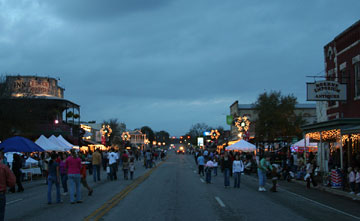 The parade was well attended, not only by residents of Boerne, but also by folks from throughout the area. Thus the crowds were ample. When I stopped in a local mini-mart to pick up a drink, the line must have been twenty people long, and was moving rather slowly. As I waited in that line, feeling anxious for fear I’d miss the start of the parade, I was reminded of one of my all-time favorite blog posts: “My Greatest Advent Discovery.” It’s time to roll out that post again, since we’ve just entered the season of Advent. (Photo: A few minutes betore the parade begins)
The parade was well attended, not only by residents of Boerne, but also by folks from throughout the area. Thus the crowds were ample. When I stopped in a local mini-mart to pick up a drink, the line must have been twenty people long, and was moving rather slowly. As I waited in that line, feeling anxious for fear I’d miss the start of the parade, I was reminded of one of my all-time favorite blog posts: “My Greatest Advent Discovery.” It’s time to roll out that post again, since we’ve just entered the season of Advent. (Photo: A few minutes betore the parade begins)
I have a confession to make: I am terrible at waiting. This makes me an especially lousy Christmas shopper, because, almost by definition, Christmas shopping requires waiting in line. Whether you’re at a fine department store or just grabbing some chips from the local mini-mart, chances are you’ll be waiting in line during the month of December. And, if you’re like me, inevitably you’ll end up right behind somebody who needs a price check on aisle 3 or who requires some sort of special assistance. This sort of thing can just about ruin the Christmas season for me, because waiting makes me grumpy.
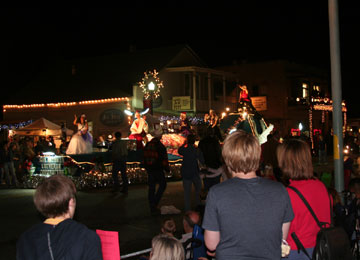 A few years ago I was waiting in a long line at Costco. In spite of my best efforts to find the shortest line, of course I ended up in the slowest moving line of all. As I stood there, I could feel my blood pressure rising. The more I waited, the more frustrated I became. Words I never say (well, almost never) filled my mind, and I’m not referring to “Happy Holidays.” “Why do I always get in the slowest line?” I asked myself. “And why is this taking so long?” I grumbled under my breath. (Photo: my son and my wife enjoying a parade float)
A few years ago I was waiting in a long line at Costco. In spite of my best efforts to find the shortest line, of course I ended up in the slowest moving line of all. As I stood there, I could feel my blood pressure rising. The more I waited, the more frustrated I became. Words I never say (well, almost never) filled my mind, and I’m not referring to “Happy Holidays.” “Why do I always get in the slowest line?” I asked myself. “And why is this taking so long?” I grumbled under my breath. (Photo: my son and my wife enjoying a parade float)
Then, all of a sudden, it dawned on me. I had one of those moments of grace, in which God managed to slip a word into my consciousness. As I stood in line at Costco, I was waiting. Waiting! I was doing exactly what Advent is all about. Of course I wasn’t waiting for God to save me or anything momentous like that. I was simply waiting to get out of that store so I could go home. But, nevertheless, I was waiting. I was forced to experience something that’s at the very heart of Advent.
So I decided, right then and there in the line at Costco, that I was going to use the experience of waiting in line as an Advent reminder. In that moment, and in similar moments yet to come, I was going to remember what Advent is all about. I was going to put myself back into the shoes of the Jews who were waiting for the Messiah. And I was going to remember that I too am waiting for Christ to return.
As I decided to let the experience of forced waiting be a moment of Advent reflection rather than a cause for getting an ulcer, I found my anger quickly drain away. Waiting in line at Costco became, not a trial to be endured, but a moment of grace. And get this: I even found myself thanking God for the chance to slow down a bit and wait. This was, indeed, a miracle.
By the time I got to check out, my heart was peaceful, even joyous. I felt as if I had discovered a treasure. The next Sunday I shared my discovery with my congregation at Irvine Presbyterian Church. In the days that followed, many of my flock told me how much their Advent had been improved by thinking of waiting in line, not as a curse, but as a potential blessing.
Honestly, I can still forget my commitment to use waiting in line as a time for Advent reflection. My gut instinct can take over. I can easily start grinding my teeth as I think of how much time I’m losing. But then a gentle breeze from the Spirit will remind me of how waiting can enrich my life, rather than rob me of joy.
In the last few years, what I hate most about the days prior to Christmas – waiting in line – has become a quasi-sacrament, a time to experience God’s grace. If you’ve never tried this, it may sound to you as if I’ve lost my mind. This sounds even sillier than wearing purple in the weeks before Christmas rather than red and green. But let me encourage you to try it. By experiencing waiting in line not as a punishment but as a opportunity to wait peacefully, you’ll find a bit of grace, hidden and ready to be discovered, much like a little picture behind one of those doors of an Advent calendar.
Topics: Advent | 7 Comments »
Advent Calendar for December 2
By Mark D. Roberts | Sunday, December 2, 2007

Click here for the December 2 Advent Calendar entry!
Topics: Advent Calendar | 4 Comments »
Good News for Adventophiles Everywhere . . . Advent Begins
By Mark D. Roberts | Sunday, December 2, 2007
Today is the first day of Advent. Yes, I know most popular Advent calendars begin with December 1, including my online version. But today is the first Sunday in Advent, which is the first official day of the Christian season. In fact, it’s the first day of the Christian year.
If you’ve been reading my blog for at least a year, you know that I’m a big fan of Advent. In fact, last year I coined the term “Adventophile” to describe myself, a lover of Advent, much as a bibliophile is a lover of books or an Anglophile is a lover of things English. Strangely enough, this word made an appearance in today’s Los Angeles Times. In an article called “Amid Christmas hype, don’t forget about Advent” by K. Connie Kang, she quotes me as saying that I’m an “Adventophile.” It’s a bit ironic that I’m helping to promoting Advent in California when I’m now a resident of Texas. Go figure!
Over the years, I’ve done plenty of blogging about Advent. You can find this material in my series: Advent and the Christian Year. If the whole idea of Advent is new to you, you might find my Advent F.A.Q. to be helpful.
If you haven’t already visited my online Advent calendar, I’d encourage you to do so. Each day of December I put up a Bible verse that relates to this season and a picture that fits with the verse. You can find today’s entry here.
 One of the resources I’ve developed for this season is Preparing for the Coming of Christ:
One of the resources I’ve developed for this season is Preparing for the Coming of Christ:
A Guide for Using the Advent Wreath. Originally, I wrote this for families at Irvine Presbyterian Church. I have revised it for use by individuals or groups. Also, I have added a bit of technical magic, so you can actually “light” the Advent wreath online. You can find today’s Advent devotional here. (Photo: An Advent wreath with the candles unlit. Visit the Advent Guide to “light” the appropriate candle for today.)
I pray that in this season of Advent you might be prepared for a richer and truer celebration of the miracle of Christmas!
Topics: Advent | 2 Comments »
My Online Advent Calendar is Up!
By Mark D. Roberts | Saturday, December 1, 2007

Click here for today’s Advent Calendar entry!
Topics: Advent Calendar | No Comments »
Only in Texas . . . I Mean Texmas
By Mark D. Roberts | Saturday, December 1, 2007
You don’t see this is California . . .

From a display in a public park in Marble Falls, Texas! Yee-haw!
Topics: Texas, Only in Texas | 1 Comment »
My “Converse with Scholars” Conversation about the Gospels is Now Available
By Mark D. Roberts | Friday, November 30, 2007
Last night I was involved in an interview/online discussion at “Converse with Scholars.” Our conversation focused on the question of the reliability of the Gospels. The 90-minute recording is now available for listening or download.
Topics: Can We Trust the Gospels?, Thinking about Faith | 1 Comment »
I Did “Converse with Scholars” Tonight
By Mark D. Roberts | Friday, November 30, 2007
Yes, right in the middle of the Cowboys and Packers football game! We did have about 60 people in the conversation. In a couple of days you can download the whole session, which lasted about 90 minutes. For now, let me encourage you to check out the “Converse with Scholars” website. Lots of fantastic material there . . . for free! And while you’re at it, see what else you can find from Reclaiming the Mind Ministries. This is a wonderful online service.
Topics: Can We Trust the Gospels?, Thinking about Faith | 2 Comments »
I’m On “Converse with Scholars” Tonight
By Mark D. Roberts | Thursday, November 29, 2007

I’m honored to be a guest on “Converse with Scholars” tonight at 10:00 EST (so 9:00 p.m. CST; 8:00 p.m. MST; and 7:00 p.m. PST). This is an online, live discussion, with audio and interaction. To listen to the conversation or to participate, check out the details from the “Converse with Scholars” website. While you’re at it, browse through some of the great information available on this site.
Topics: News | 3 Comments »
Speaking of Musicians After God’s Own Heart . . . Let Me Introduce Jeff Johnson, Brian Dunning, and Gwen Franz
By Mark D. Roberts | Thursday, November 29, 2007
Part 8 of series: Sharing Laity Lodge
Permalink for this post / Permalink for this series
In my last post I wrote about meeting Brian Moss, a musician “after God’s own heart.” Earlier this week at Laity Lodge I added three more musicians to my list of talented artists who seek God’s glory in all they do. (Ironically, they happen to be friends of Brian Moss.)
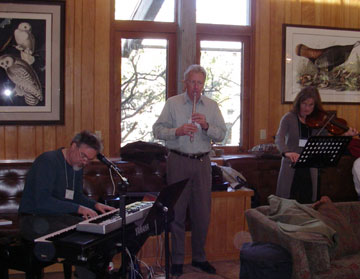 At a pastors’ and leaders’ retreat that happened a few days ago, we were led in musical worship by Jeff Johnson, Brian Dunning, and Gwen Franz. Jeff played keyboard and sang. Brian played flute and other similar instruments. Gwen played the viola. Sometimes they played as we listened. Sometimes they played as we sang along. One night they led us in what they call a Selah service, a worship time of performed and sung music, along with silence and prayer.
At a pastors’ and leaders’ retreat that happened a few days ago, we were led in musical worship by Jeff Johnson, Brian Dunning, and Gwen Franz. Jeff played keyboard and sang. Brian played flute and other similar instruments. Gwen played the viola. Sometimes they played as we listened. Sometimes they played as we sang along. One night they led us in what they call a Selah service, a worship time of performed and sung music, along with silence and prayer.
This trio played several familiar hymns as well as newer songs, many written by Jeff Johnson (sometimes in collaboration with Brian Moss). With strong Celtic influences, their music was as entrancing as it was pleasant to the ears. They had a marvelous way of enhancing the meaning of Christian music through their instruments. And, unlike some performers who can’t get out of the spotlight enough to lead worship effectively, this trio exemplified the humility that’s essential to strong worship leadership.
You may very well have heard some of the music of Jeff Johnson and Brian Dunning. Many of their songs have been included in Windham Hill recordings, as well movie soundtracks (such as Gangs of New York). One of their albums, A Quiet Knowing – Canticles for the Heart, is one of my all-time favorites for times of prayer. I have probably used this album well over a hundred times during my personal devotions. (For an example of the instrumental music on A Quiet Knowing, check out this clip of “Amazing Grace.” For more information on this album or to order it, look here. You can also find their music at iTunes. For more information and a way to sample and/or purchase the music of Jeff, Brian, and their colleagues, check out the ArkMusic website.
The Selah Service is one of Jeff Johnson’s latest passions. It is a worship experienced that uses music, Scripture, prayer, and silence to facilitate devotion to God. It is similar to a Taizé service in its simplicity and open-heartedness. If you’re looking for new ways to grow in your personal worship, or to help you church to grow, check out Jeff’s Selah Service website. There you’ll find more explanation, examples, and resources.
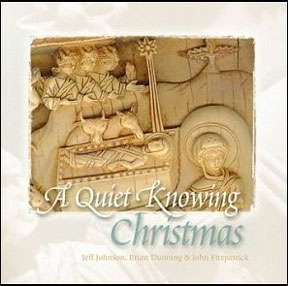 I was very pleased to learn that Jeff and his colleagues have produced several Christmas albums. I purchased two of these and am listening to them with great delight. Both feature instrumental arrangements of Christmas and Advent music, some quite familiar, some more unusual. (If you’re familiar with the Windham Hill Winter Solstice and Christmas albums, you’ll recognize several of these arrangements.) Click here to listen to a part of “O Come, O Come, Emmanuel” from A Quiet Knowing Christmas; and here from a bit of “Sing We Now of Christmas” from Stars in the Morning East – A Christmas Meditation. (Photo: A Quiet Knowing Christmas)
I was very pleased to learn that Jeff and his colleagues have produced several Christmas albums. I purchased two of these and am listening to them with great delight. Both feature instrumental arrangements of Christmas and Advent music, some quite familiar, some more unusual. (If you’re familiar with the Windham Hill Winter Solstice and Christmas albums, you’ll recognize several of these arrangements.) Click here to listen to a part of “O Come, O Come, Emmanuel” from A Quiet Knowing Christmas; and here from a bit of “Sing We Now of Christmas” from Stars in the Morning East – A Christmas Meditation. (Photo: A Quiet Knowing Christmas)
I love the music of Christmas. But early in the Christmas season, which is actually the season of Advent if you follow the Christian year, I’m not ready for “Hark the Herald Angels Sing” blasted by a 50-voice choir. And I’m really not ready for endless versions of “The Little Drummer Boy” in shopping mall Muzak. I want music that invites me slowly, quietly into the Christmas spirit, music that heightens my hope and expectation, which is what Advent is really all about. The Christmas albums produced by Jeff Johnson and his friends are perfect for this purpose. I highly recommend them. In fact, if I were you, I’d go straight to the Ark Music website and examine what’s available. You can also purchase these albums from Amazon, if you prefer: Stars in the Morning East; A Quiet Knowing Christmas. (You get a better deal from Ark Music, but you need to use PayPal.)
Topics: Sharing Laity Lodge, Christmas | 3 Comments »
A Musician After God’s Own Heart
By Mark D. Roberts | Tuesday, November 27, 2007
Part 7 of series: Sharing Laity Lodge
Permalink for this post / Permalink for this series
A few weeks ago I got to know Brian Moss, “a musician after God’s own heart.” As you may know, this description was first used of David in the Old Testament. When Saul dishonored the Lord, Samuel said to him, “[N]ow your kingdom will not continue; the LORD has sought out a man after his own heart; and the LORD has appointed him to be ruler over his people, because you have not kept what the LORD commanded you” (1 Samuel 13:14). This man “after God’s heart” was David, who would one day be king of Israel.
David is well known to us, not only as a central figure in Old Testament history, but also through his poetry. He is the author of many of the biblical Psalms, and the inspiration for many others. In the Psalms we see the heart of David, the heart that yearned for God.
 Why do I call Brian Moss “a musician after God’s own heart”? Well, on the most obvious level, like David, he sings praises to God as a talented singer and pianist. And, like David, Brian doesn’t simply perform, but he draws people into worship. He is an astute and sensitive worship leader, who seeks to draw people’s attention, not to himself, but to the Lord.
Why do I call Brian Moss “a musician after God’s own heart”? Well, on the most obvious level, like David, he sings praises to God as a talented singer and pianist. And, like David, Brian doesn’t simply perform, but he draws people into worship. He is an astute and sensitive worship leader, who seeks to draw people’s attention, not to himself, but to the Lord.
Brian Moss is like David in that he is also a gifted poet and writer of worship music. One of the things he has done so well is to take old hymns and set them to new music, thus bringing to life some texts that are lyrically rich and well worth singing today. Check our, for example, his album, Not What My Hands Have Done. You can hear an excerpt from this album at Brian’s myspace. You can order it from iTunes also.
 But Brian has engaged upon a classic songwriting project that shows even more plainly his similarity to David. His recent album, Prayerbook No. 1, is the beginning of a 10-volume treatment of the Psalms. That’s right, all 150 of them. You can learn more about this project from Brian’s blog: prayerbookproject.
But Brian has engaged upon a classic songwriting project that shows even more plainly his similarity to David. His recent album, Prayerbook No. 1, is the beginning of a 10-volume treatment of the Psalms. That’s right, all 150 of them. You can learn more about this project from Brian’s blog: prayerbookproject.
Like some of the great hymn writers of history, Isaac Watts, for example, Brian takes a psalm and uses it as the basis for a song. The song draws from the words of the psalm without simply putting the psalm itself to music. Here, for example, is Psalm 1 and Brian’s song, called, “Joy Will Come to You.”
Psalm 1
1 Happy are those
who do not follow the advice of the wicked,
or take the path that sinners tread,
or sit in the seat of scoffers;
2 but their delight is in the law of the LORD,
and on his law they meditate day and night.
3 They are like trees
planted by streams of water,
which yield their fruit in its season,
and their leaves do not wither.
In all that they do, they prosper.
4 The wicked are not so,
but are like chaff that the wind drives away.
5 Therefore the wicked will not stand in the judgment,
nor sinners in the congregation of the righteous;
6 for the LORD watches over the way of the righteous,
but the way of the wicked will perish.“Joy Will Come to You”
Joy will come to you
In the word, the way
Hold it in the night
And live it in the day
Like a tree beside
The running, living blue
Water into life
This joy will come to youWalk away from sin
Hate has many eyes
Mocking what is good
Their house is built on liesJoy will come to you
In the word the way
Hold it in the night
And live it in the day
Like a tree beside
The running, living blue
Water into life
This joy will come to you
Joy will come to youCopyright 2005, Parson John Publishing (ASCAP), by Brian Moss
You can hear Brian sing “Joy Will Come to You” from his myspace.
I had the chance to get to know Brian and his wife Stephanie while they were out at Laity Lodge. They are both kind, humble, and amazingly talented people. Stephanie is a ballet dancer in addition to being a mother of four!
I commend Brian’s music to you. How exciting it is to see new artists drawing inspiration from the Psalms so that we might also be people after God’s own heart.
Topics: Sharing Laity Lodge | 1 Comment »
Mark Toone and Grappling with God
By Mark D. Roberts | Monday, November 26, 2007
Part 6 of series: Sharing Laity Lodge
Permalink for this post / Permalink for this series
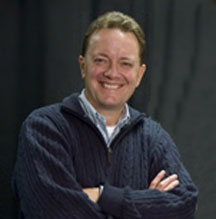 A few weeks ago Mark Toone spoke at Laity Lodge for a men’s retreat from Covenant Presbyterian Church in Austin, Texas. Mark is the Senior Pastor of Chapel Hill Presbyterian Church in Gig Harbor, Washington. His creative and challenges message at Laity Lodge filled out the theme “Character Sketches,” and focused on several biblical figures, including Jacob and Joseph.
A few weeks ago Mark Toone spoke at Laity Lodge for a men’s retreat from Covenant Presbyterian Church in Austin, Texas. Mark is the Senior Pastor of Chapel Hill Presbyterian Church in Gig Harbor, Washington. His creative and challenges message at Laity Lodge filled out the theme “Character Sketches,” and focused on several biblical figures, including Jacob and Joseph.
Mark’s message on Jacob considered the incident in Genesis 32 when Jacob wrestled with the Lord. Here’s the text:
24 Jacob was left alone; and a man wrestled with him until daybreak. 25 When the man saw that he did not prevail against Jacob, he struck him on the hip socket; and Jacob’s hip was put out of joint as he wrestled with him. 26 Then he said, “Let me go, for the day is breaking.” But Jacob said, “I will not let you go, unless you bless me.” 27 So he said to him, “What is your name?” And he said, “Jacob.” 28 Then the man said, “You shall no longer be called Jacob, but Israel, for you have striven with God and with humans, and have prevailed.” 29 Then Jacob asked him, “Please tell me your name.” But he said, “Why is it that you ask my name?” And there he blessed him. 30 So Jacob called the place Peniel, saying, “For I have seen God face to face, and yet my life is preserved.”
Mark stated that we all have times of wrestling with God, times when we fight against God’s will for us or when we hang onto God for dear life. “God wants to use these wrestling times,” Mark explained, “to stretch us and shape us.” In this process we become the people God wants us to be.
As an illustration of the centrality of wrestling with God in the Christian life, Mark citied the mission statement of his church. It begins:
Our mission as a church is to present everyone mature in Chirst.
To accomplish our mission, we have identified five areas in which to provide opportunities for our church family to mature in their walk with Christ and to which we pledge our commitment as a body. We call these the five Gs:
• Gather
• Glorify
• Grapple
• Give
• Go
Now I’ve seen plenty of church mission statements in my life. Four of these five Gs are fairly predictable (which is not a criticism, by the way. One would hope that glorifying God is central to the mission of every church). But I have never seen a church give so much centrality to “Grapple.” The expansion of “Grapple” on the Chapel Hill website reads:
A sincere and prayerful commitment to the Lordship of Christ over my entire life. “I promise courageously to learn to follow Jesus as Lord of every area of my life.” Luke 6:46; Luke 9:23-25.
The main point of “Grapple” is commitment to Christ as Lord. But I’m impressed by the realism of the grappling image. We who seek to live under the Lordship of Christ often find that, like Jacob, we have to wrestle with Him before we are prepared to submit to Him. The amazing part of this engagement is that God allows us to grapple with Him without wiping us out. He not only brings us into conformity with His will through this gracious process, but He also shapes us to be more like Him.
It should come as no surprise that I would be favorably impressed by the prominence of grappling in the mission statement of Chapel Hill Presbyterian Church. My book on prayer is called No Holds Barred: Wrestling with God in Prayer. The Psalms, it seems to me, illustrate wonderfully the freedom we have to wrestle with God. Grappling isn’t just for Mark Toone and the members of Chapel Hill Presbyterian Church. It’s for all of us who seek to follow Jesus and who have given our lives to Him.
Topics: Sharing Laity Lodge | 5 Comments »
Sunday Inspiration from Pray the Gospels
By Mark D. Roberts | Sunday, November 25, 2007
Excerpt
Six days later, Jesus took with him Peter and James and John, and led them up a high mountain apart, by themselves. And he was transfigured before them, and his clothes became dazzling white, such as no one on earth could bleach them.
Mark 9:2-3
Click here to read all of Mark 9:2-8
Prayer
Lord Jesus, in this astounding story we catch a glimpse of Your divine glory. Like Peter, James, and John, we watch as You are transfigured before us. And, like those first disciples, we sometimes find ourselves at a loss to know exactly how to respond.
You are not just some royal figure, but the King of kings and Lord of lords. Before You all creation will bow in worship. It is our calling, our privilege, indeed, part of our created purpose, to anticipate this universal worship by offering ourselves to You in humble submission. You are our King, the One before whom bow, presenting our lives, our souls, our love.
 Christ the King, be exalted this day throughout the world! May Your people lift up Your name to that all may be drawn to You. And may my voice add to the chorus of Your praise. You are not just the King of kings and Lord of lords, but my King and my Lord. Here I am, Jesus, all for You.
Christ the King, be exalted this day throughout the world! May Your people lift up Your name to that all may be drawn to You. And may my voice add to the chorus of Your praise. You are not just the King of kings and Lord of lords, but my King and my Lord. Here I am, Jesus, all for You.
Questions for Reflection
How do you honor Christ as King?
Is Jesus the King of your life each day? Each moment? How do you respond to His kingship in your daily life?
Christ the King Sunday
Today is “Christ the King” Sunday in the Christian year, the last Sunday of the year. Next Sunday will be the first Sunday of Advent, which is the beginning of the Christian year.
Painting: “Christ Enthroned” from The Stefaneschi Triptych by Giotto di Bondone, c. 1330.
Pray the Gospels
Pray the Gospels is one of my two devotional websites. The other is Pray the Psalms. Both sites include a daily Bible reading from either the Gospels or the Psalms, along with a prayer and some additional thoughts or questions for reflection.
Topics: Sunday Inspiration | 1 Comment »
You Know You’re in Texas When . . .
By Mark D. Roberts | Saturday, November 24, 2007
. . . you find out that Jesus has His own dry cleaning and laundry service!

Topics: Only in Texas | 3 Comments »















